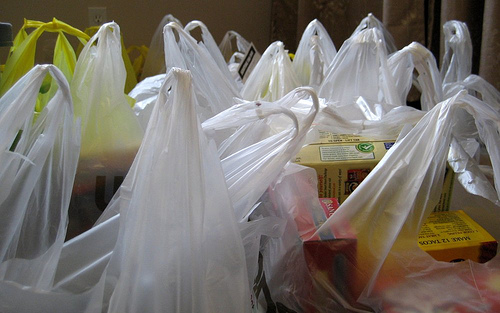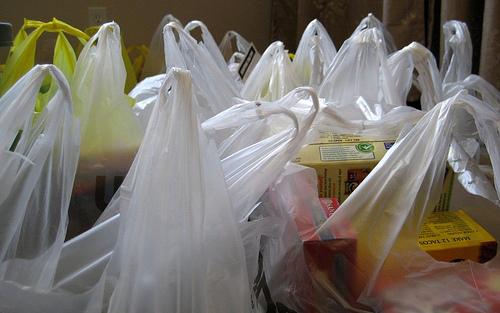 Plastic bags may be free, but it costs the U.S. almost $20 billion in raw materials every year to produce them.Photo courtesy mtsofan via FlickrA science advisor to the U.K. government predicts the growth of artificial meat in tanks to meet the needs of a burgeoning global middle class and to address the impacts on natural resources from raising livestock in more natural ways. The Environmental Protection Agency is poised to grant approval to a Swiss chemical company to coat underwear with nano-particles of silver that would allow us to wear the same skivvies for weeks without washing (ugh!). And a British utility, GENeco, has unveiled a converted VW Beetle called the Bio-Bug that runs on human waste.
Plastic bags may be free, but it costs the U.S. almost $20 billion in raw materials every year to produce them.Photo courtesy mtsofan via FlickrA science advisor to the U.K. government predicts the growth of artificial meat in tanks to meet the needs of a burgeoning global middle class and to address the impacts on natural resources from raising livestock in more natural ways. The Environmental Protection Agency is poised to grant approval to a Swiss chemical company to coat underwear with nano-particles of silver that would allow us to wear the same skivvies for weeks without washing (ugh!). And a British utility, GENeco, has unveiled a converted VW Beetle called the Bio-Bug that runs on human waste.
These announcements, from just the last week, show the endless creativity and business opportunities from low carbon, resource-efficient innovation. But as California stands ready this week to pass a law that would ban the distribution of wasteful single-use plastic bags, the opponents of the bill are certain it will doom consumers because, they insist, it is so hard to remember to bring reusable bags when we go shopping. Is such a clever, creative species really that forgetful or is this a symptom of some kind of eco-amnesia and therefore not our fault?
First, some facts. According to the Guinness Book of World Records, the world’s most ubiquitous consumer item is the plastic shopping bag. The Worldwatch Institute estimates some four trillion of them were produced last year (not hard to believe — we use 19 billion each year in California alone). The Film and Bag Federation reports that department stores began dispensing them in the late 1970s and supermarkets didn’t give them away until the early 1980s. Retailers in the U.S., they say, spend $4 billion a year on these plastic bags, a cost which certainly is passed onto customers. And the total cost of collecting plastic litter in the U.S. each year, including a lot of these disposable bags, is estimated at another $11.5 billion.
We use about 38 million barrels of oil to make those bags each year — roughly 10 times the volume of the BP Deepwater Horizon oil spill. At $70 per barrel, that’s $2.7 billion in raw material costs alone. Taken together, the U.S. spends close to $20 billion every year on a product we think of as “free” and “disposable.”
California Assembly Bill 1998 will pass this week if we can convince state legislators that humans are smart enough to bring their own sacks for carting off a loaf of bread. The Chinese built the Great Wall to keep looters from getting anything of value out of China, probably because they knew the Huns were smart enough to bring their own bags and nothing else would deter them from their annual “shopping” sprees. Oh, and China has now banned the same single use plastic bags that California proposes to outlaw. So has Germany, Uganda, and Mexico City, to name a few of the dozens of other places also ending this astonishingly wasteful practice.
Or are the critics right? Do we suffer from some collective amnesia when it comes to matters of our own sustainability on the planet? After all, we apparently forgot about the 1969 Unocal oil rig blowout near Santa Barbara, Calif.; the Ixtoc 1 oil rig blowout in Mexico 10 years later; the Exxon Valdez oil spill 10 years after that; and paid the price for this eco-amnesia in the summer of 2010 in the Gulf of Mexico, because we forgot to demand that regulators stay out of bed (literally in some cases) with industries they are charged to regulate.
I acknowledge that no matter how high the price, we continually foul our nest and squander our natural resource inheritance from one generation to the next, but as a resident of California and the world, I’d like to urge my state Legislature to take a chance on the inherent intelligence of their constituents and to vote yes on … uh … what was I just talking about?



